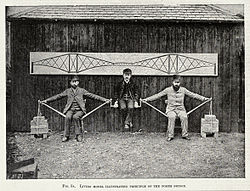Forth Rail Bridge
- For the nearby road bridge, see Forth Road Bridge.
The Forth Rail Bridge is more correctly called the Forth Bridge, but the title is to distinguish it from the nearby Forth Road Bridge). It is a railway bridge across the Firth of Forth (part of the River Forth) in Scotland.
The bridge is a UNESCO World Heritage Site.[1]
History
Built in 1890, it is a cantilever bridge design, with three major sections, each about 1,710 feet (520 m) long, connecting to each other. The bridge is 8,296 feet (2,529 m) long, and is 150 feet (46 m) above the water. It carries about 190-200 trains every day.
More than 55,000 tons of steel were used, as well as 18,122 m³ of granite and over eight million rivets. The bridge has a speed limit of 50 mph (80 km/h) for passenger trains and 20 mph (32 km/h) for freight trains. The weight limit for any train on the bridge is 1,422 tonnes (1,442,000 kg). Approximately 4,600 workers were employed in construction of the bridge.
Forth Rail Bridge Media
Close up on the base of one of the three double-cantilevers of the bridge
The southern approach to the Forth Bridge, designed by James Carswell
A view from South Queensferry of the bridge's cantilever towers being built in 1887.
Related pages
References
- ↑ UNESCO, "Sites in Norway, Germany, Israel, UK and USA inscribed on UNESCO’s World Heritage List"; retrieved 2018-6-20.
Other websites
| Wikimedia Commons has media related to Lua error in Module:Commons_link at line 62: attempt to index field 'wikibase' (a nil value).. |
- Forth Rail Bridge Archived 2008-02-22 at the Wayback Machine
![]()










